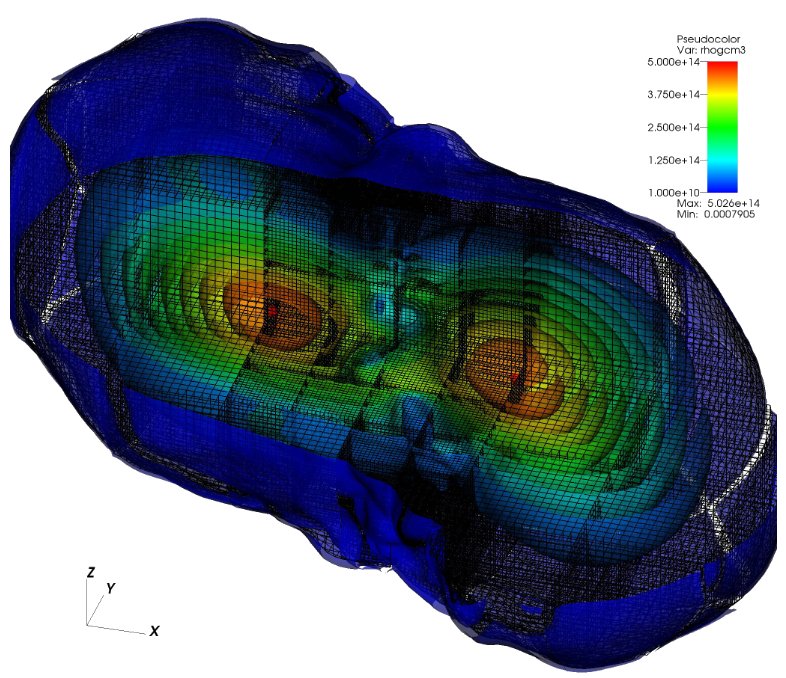
About
GR-Athena++ is a scalable code for 3+1 numerical relativity refactored from the Athena++ magnetohydrodynamics code and adaptive mesh refinement (AMR) framework. The new main features of the code are
- Support for vertex-centered and cell-centered spacetime variables
- Dynamical spacetime solver based on the Z4c formulation of 3+1 general relativity and high-order operators
- Adaptive mesh refinement algorithms for black hole evolutions in the puncture framework
- GRMHD solver on dynamical spacetimes based on the conservative 3+1 Eulerian “Valencia” formulation and Athena++ constrained transport algorithm
- Radiation transport solver on dynamical spacetimes based on the M1 formulation
- Support for various equations of state, including tabular microphysical models
- Deleptonization scheme for stellar core collapse
- Gravitational-wave extraction algorithms based on Newmann-Penrose-Weyl and Regge-Wheeler-Zerilli approaches, output for Cauchy Characteristic evolution
- Apparent horizon finder based on fast flow algorithm
- Support for various initial data solvers and readers, including Lorene, SGRID, RNS, TwoPunctures
GR-Athena++ is developed by the Computational Relativity (CoRe) collaboration at Jena (Germany) and Penn State (USA).
Open source
The code is developed open source, the latest version can be retrived from the repository by typing
git clone https://github.com/computationalrelativity/gr-athena
Terms of use
The code is distributed in the hope that it will be useful, but without any warranty or support. If you use the code for your research, please cite the relevant method papers listed below.
For reporting potential performance or correctness bugs in the code and algorithm, please open a detailed GitHub Issue. High quality pull requests for bugfixes or new features are accepted on a case-by-case basis. Please contact the relevant code maintainer(s) before expending too much effort on a lengthy PR.
Method papers
- GR-Athena++: Puncture Evolutions on Vertex-centered Oct-tree Adaptive Mesh Refinement Daszuta B., Zappa F., Cook W., Radice D., Bernuzzi S., and Morozova V. Astrophys.J.Supp. 257 (2021) 2, 25 (bib)
- GR-Athena++: General-relativistic magnetohydrodynamics simulations of neutron star spacetimes Cook W., Daszuta B., Fields J., Hammond P., Albanesi S., Zappa F., Bernuzzi S., and Radice D. Astrophys.J.Supp. 227 (2025) 1, 3 (bib)
- Numerical relativity simulations of compact binaries: comparison of cell- and vertex-centered adaptive meshes Daszuta B., Cook W., Hammond P., Fields J., Gutiérrez E.M., Bernuzzi S., Radice D. Physical Review D, 112 (2015) 10, 103006 (bib)
Funding
The development of GR-Athena++ was supported by the EU H2020 under ERC Starting Grant, no.~BinGraSp-714626 (PI Bernuzzi), the EU Horizon under ERC Consolidator Grant, no. InspiReM-101043372 (PI Bernuzzi), NASA through under 80NSSC21K1720 (PI Radice), the US Department of Energy under grant DE-SC0021177 (PI Radice), and the National Science Foundation under the grants PHY-2116686 (PI Stiner) and AST-2108467 (PI Radice).